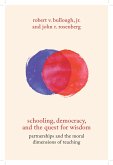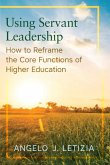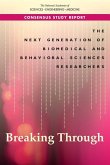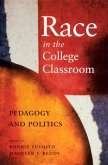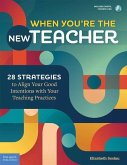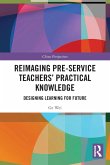The Synergistic Classroom
Interdisciplinary Teaching in the Small College Setting
Herausgeber: Campion, Corey; Angello, Aaron
The Synergistic Classroom
Interdisciplinary Teaching in the Small College Setting
Herausgeber: Campion, Corey; Angello, Aaron
- Broschiertes Buch
- Merkliste
- Auf die Merkliste
- Bewerten Bewerten
- Teilen
- Produkt teilen
- Produkterinnerung
- Produkterinnerung
Written by faculty engaged in the design and delivery of interdisciplinary courses, programs, and experiential learning opportunities in the small college setting, The Synergistic Classroom addresses the many ways faculty can leverage their institutions' small size and openness to pedagogical experimentation to overcome the challenges of limited institutional resources and enrollment concerns and better prepare students for life and work in the twenty-first century.
Andere Kunden interessierten sich auch für
![Schooling, Democracy, and the Quest for Wisdom Schooling, Democracy, and the Quest for Wisdom]() Robert V BulloughSchooling, Democracy, and the Quest for Wisdom41,99 €
Robert V BulloughSchooling, Democracy, and the Quest for Wisdom41,99 €![Using Servant Leadership Using Servant Leadership]() Angelo J LetiziaUsing Servant Leadership49,99 €
Angelo J LetiziaUsing Servant Leadership49,99 €![The Next Generation of Biomedical and Behavioral Sciences Researchers The Next Generation of Biomedical and Behavioral Sciences Researchers]() National Academies of Sciences Engineering and MedicineThe Next Generation of Biomedical and Behavioral Sciences Researchers56,99 €
National Academies of Sciences Engineering and MedicineThe Next Generation of Biomedical and Behavioral Sciences Researchers56,99 €![Race in the College Classroom Race in the College Classroom]() Race in the College Classroom53,99 €
Race in the College Classroom53,99 €![When You're the New Teacher When You're the New Teacher]() Elizabeth SoslauWhen You're the New Teacher31,99 €
Elizabeth SoslauWhen You're the New Teacher31,99 €![Reimaging Pre-Service Teachers' Practical Knowledge Reimaging Pre-Service Teachers' Practical Knowledge]() Ge WeiReimaging Pre-Service Teachers' Practical Knowledge63,99 €
Ge WeiReimaging Pre-Service Teachers' Practical Knowledge63,99 €![Been There, Should've Done That Been There, Should've Done That]() Suzette TylerBeen There, Should've Done That13,99 €
Suzette TylerBeen There, Should've Done That13,99 €-
-
-
Written by faculty engaged in the design and delivery of interdisciplinary courses, programs, and experiential learning opportunities in the small college setting, The Synergistic Classroom addresses the many ways faculty can leverage their institutions' small size and openness to pedagogical experimentation to overcome the challenges of limited institutional resources and enrollment concerns and better prepare students for life and work in the twenty-first century.
Hinweis: Dieser Artikel kann nur an eine deutsche Lieferadresse ausgeliefert werden.
Hinweis: Dieser Artikel kann nur an eine deutsche Lieferadresse ausgeliefert werden.
Produktdetails
- Produktdetails
- Verlag: Rutgers University Press
- Seitenzahl: 232
- Erscheinungstermin: 16. Oktober 2020
- Englisch
- Abmessung: 226mm x 150mm x 18mm
- Gewicht: 340g
- ISBN-13: 9781978818415
- ISBN-10: 1978818416
- Artikelnr.: 58738122
- Herstellerkennzeichnung
- Produktsicherheitsverantwortliche/r
- Europaallee 1
- 36244 Bad Hersfeld
- gpsr@libri.de
- Verlag: Rutgers University Press
- Seitenzahl: 232
- Erscheinungstermin: 16. Oktober 2020
- Englisch
- Abmessung: 226mm x 150mm x 18mm
- Gewicht: 340g
- ISBN-13: 9781978818415
- ISBN-10: 1978818416
- Artikelnr.: 58738122
- Herstellerkennzeichnung
- Produktsicherheitsverantwortliche/r
- Europaallee 1
- 36244 Bad Hersfeld
- gpsr@libri.de
COREY CAMPION is an associate professor of history and global studies and the director of the master of arts in humanities program at Hood College in Frederick, Maryland. AARON ANGELLO is the Sophie. M. Libman NEH Professor of Humanities at Hood College in Frederick, Maryland.
Contents
Introduction: Building Bridges in a Land of Colleges
Corey Campion
Part I: Teaching Across the Disciplines
Chapter 1: The Anxiety of Interdisciplinary Teaching
Aaron Angello
Chapter 2: Challenging the Discipline: First-Year Seminars and the Benefits
of an Interdisciplinary Model
Paul D. Reich
Chapter 3: More Than Just Another Core Class: The Interdisciplinary
Composition Course
Patricia Marchesi
Chapter 4: Breaking Boundaries: Reflections on an Interdisciplinary Course
on Race and Graphic Narrative
Patrick L. Hamilton and Allan W. Austin
Chapter 5: Interdisciplinary Interactivity: Team-Teaching App Design at a
Small College
Christine Dehne and Jonathan Munson
Chapter 6: Honeybees and the Transdisciplinary Classroom: Bridging the Gaps
between History, Environmental Science and Global Studies
Corey Campion and April Boulton
Part II: Programming Across the Disciplines
Chapter 7: Learning, Leading, and Succeeding: Collaborative Culture and
Experiential Interdisciplinary Studies at Nichols College
Erika Cornelius Smith and Maryann Conrad
Chapter 8: Why Can’t It Be Both?: Supporting Students Across the Spectrum
of Abilities and Ambitions
Julia Klimek
Chapter 9: From Chemistry to History to Psychology: Creating a
Multidisciplinary Minor in Investigative Forensics
Christine D. Myers and Audra L. Goach
Chapter 10: Creating a ‘Space of Appearance’ through the Rollins College
Foundations in Liberal Arts (rFLA) Program
Hilary Cooperman
Chapter 11: Flipping the Humanities Back into Mathematics
Winston Ou
Chapter 12: Arts in the Laboratory: A Multidisciplinary Approach to Honors
Education in a Small College Setting
Lana A. Whited and Sharon E. Stein
Part III: Exploring Across the Disciplines
Chapter 13: Science and Cultural Competence: Incorporating Hispanic
Migrants’ Knowledge and Experience in the Spanish Curriculum
Martha Bárcenas-Mooradian
Chapter 14: Authenticity and Empathy in Education: Team-Teaching “The
Voices Project: Mental Health”
Amanda M. Caleb and Alicia H. Nordstrom
Chapter 15: Experiential Learning in the Rural, Small College Setting:
Creating an “Appalachian Cluster”
Tina L. Hanlon, Peter Crow, Susan V. Mead, Carolyn L. Thomas, and Delia R.
Heck
Chapter 16: “Hold my Piña Colada: Operational and Ethical Considerations
for Interdisciplinary Experiential Learning Study Abroad”
Paola Prado and Autumn Quezada-Grant
Notes on Contributors
Index
Introduction: Building Bridges in a Land of Colleges
Corey Campion
Part I: Teaching Across the Disciplines
Chapter 1: The Anxiety of Interdisciplinary Teaching
Aaron Angello
Chapter 2: Challenging the Discipline: First-Year Seminars and the Benefits
of an Interdisciplinary Model
Paul D. Reich
Chapter 3: More Than Just Another Core Class: The Interdisciplinary
Composition Course
Patricia Marchesi
Chapter 4: Breaking Boundaries: Reflections on an Interdisciplinary Course
on Race and Graphic Narrative
Patrick L. Hamilton and Allan W. Austin
Chapter 5: Interdisciplinary Interactivity: Team-Teaching App Design at a
Small College
Christine Dehne and Jonathan Munson
Chapter 6: Honeybees and the Transdisciplinary Classroom: Bridging the Gaps
between History, Environmental Science and Global Studies
Corey Campion and April Boulton
Part II: Programming Across the Disciplines
Chapter 7: Learning, Leading, and Succeeding: Collaborative Culture and
Experiential Interdisciplinary Studies at Nichols College
Erika Cornelius Smith and Maryann Conrad
Chapter 8: Why Can’t It Be Both?: Supporting Students Across the Spectrum
of Abilities and Ambitions
Julia Klimek
Chapter 9: From Chemistry to History to Psychology: Creating a
Multidisciplinary Minor in Investigative Forensics
Christine D. Myers and Audra L. Goach
Chapter 10: Creating a ‘Space of Appearance’ through the Rollins College
Foundations in Liberal Arts (rFLA) Program
Hilary Cooperman
Chapter 11: Flipping the Humanities Back into Mathematics
Winston Ou
Chapter 12: Arts in the Laboratory: A Multidisciplinary Approach to Honors
Education in a Small College Setting
Lana A. Whited and Sharon E. Stein
Part III: Exploring Across the Disciplines
Chapter 13: Science and Cultural Competence: Incorporating Hispanic
Migrants’ Knowledge and Experience in the Spanish Curriculum
Martha Bárcenas-Mooradian
Chapter 14: Authenticity and Empathy in Education: Team-Teaching “The
Voices Project: Mental Health”
Amanda M. Caleb and Alicia H. Nordstrom
Chapter 15: Experiential Learning in the Rural, Small College Setting:
Creating an “Appalachian Cluster”
Tina L. Hanlon, Peter Crow, Susan V. Mead, Carolyn L. Thomas, and Delia R.
Heck
Chapter 16: “Hold my Piña Colada: Operational and Ethical Considerations
for Interdisciplinary Experiential Learning Study Abroad”
Paola Prado and Autumn Quezada-Grant
Notes on Contributors
Index
Contents
Introduction: Building Bridges in a Land of Colleges
Corey Campion
Part I: Teaching Across the Disciplines
Chapter 1: The Anxiety of Interdisciplinary Teaching
Aaron Angello
Chapter 2: Challenging the Discipline: First-Year Seminars and the Benefits
of an Interdisciplinary Model
Paul D. Reich
Chapter 3: More Than Just Another Core Class: The Interdisciplinary
Composition Course
Patricia Marchesi
Chapter 4: Breaking Boundaries: Reflections on an Interdisciplinary Course
on Race and Graphic Narrative
Patrick L. Hamilton and Allan W. Austin
Chapter 5: Interdisciplinary Interactivity: Team-Teaching App Design at a
Small College
Christine Dehne and Jonathan Munson
Chapter 6: Honeybees and the Transdisciplinary Classroom: Bridging the Gaps
between History, Environmental Science and Global Studies
Corey Campion and April Boulton
Part II: Programming Across the Disciplines
Chapter 7: Learning, Leading, and Succeeding: Collaborative Culture and
Experiential Interdisciplinary Studies at Nichols College
Erika Cornelius Smith and Maryann Conrad
Chapter 8: Why Can’t It Be Both?: Supporting Students Across the Spectrum
of Abilities and Ambitions
Julia Klimek
Chapter 9: From Chemistry to History to Psychology: Creating a
Multidisciplinary Minor in Investigative Forensics
Christine D. Myers and Audra L. Goach
Chapter 10: Creating a ‘Space of Appearance’ through the Rollins College
Foundations in Liberal Arts (rFLA) Program
Hilary Cooperman
Chapter 11: Flipping the Humanities Back into Mathematics
Winston Ou
Chapter 12: Arts in the Laboratory: A Multidisciplinary Approach to Honors
Education in a Small College Setting
Lana A. Whited and Sharon E. Stein
Part III: Exploring Across the Disciplines
Chapter 13: Science and Cultural Competence: Incorporating Hispanic
Migrants’ Knowledge and Experience in the Spanish Curriculum
Martha Bárcenas-Mooradian
Chapter 14: Authenticity and Empathy in Education: Team-Teaching “The
Voices Project: Mental Health”
Amanda M. Caleb and Alicia H. Nordstrom
Chapter 15: Experiential Learning in the Rural, Small College Setting:
Creating an “Appalachian Cluster”
Tina L. Hanlon, Peter Crow, Susan V. Mead, Carolyn L. Thomas, and Delia R.
Heck
Chapter 16: “Hold my Piña Colada: Operational and Ethical Considerations
for Interdisciplinary Experiential Learning Study Abroad”
Paola Prado and Autumn Quezada-Grant
Notes on Contributors
Index
Introduction: Building Bridges in a Land of Colleges
Corey Campion
Part I: Teaching Across the Disciplines
Chapter 1: The Anxiety of Interdisciplinary Teaching
Aaron Angello
Chapter 2: Challenging the Discipline: First-Year Seminars and the Benefits
of an Interdisciplinary Model
Paul D. Reich
Chapter 3: More Than Just Another Core Class: The Interdisciplinary
Composition Course
Patricia Marchesi
Chapter 4: Breaking Boundaries: Reflections on an Interdisciplinary Course
on Race and Graphic Narrative
Patrick L. Hamilton and Allan W. Austin
Chapter 5: Interdisciplinary Interactivity: Team-Teaching App Design at a
Small College
Christine Dehne and Jonathan Munson
Chapter 6: Honeybees and the Transdisciplinary Classroom: Bridging the Gaps
between History, Environmental Science and Global Studies
Corey Campion and April Boulton
Part II: Programming Across the Disciplines
Chapter 7: Learning, Leading, and Succeeding: Collaborative Culture and
Experiential Interdisciplinary Studies at Nichols College
Erika Cornelius Smith and Maryann Conrad
Chapter 8: Why Can’t It Be Both?: Supporting Students Across the Spectrum
of Abilities and Ambitions
Julia Klimek
Chapter 9: From Chemistry to History to Psychology: Creating a
Multidisciplinary Minor in Investigative Forensics
Christine D. Myers and Audra L. Goach
Chapter 10: Creating a ‘Space of Appearance’ through the Rollins College
Foundations in Liberal Arts (rFLA) Program
Hilary Cooperman
Chapter 11: Flipping the Humanities Back into Mathematics
Winston Ou
Chapter 12: Arts in the Laboratory: A Multidisciplinary Approach to Honors
Education in a Small College Setting
Lana A. Whited and Sharon E. Stein
Part III: Exploring Across the Disciplines
Chapter 13: Science and Cultural Competence: Incorporating Hispanic
Migrants’ Knowledge and Experience in the Spanish Curriculum
Martha Bárcenas-Mooradian
Chapter 14: Authenticity and Empathy in Education: Team-Teaching “The
Voices Project: Mental Health”
Amanda M. Caleb and Alicia H. Nordstrom
Chapter 15: Experiential Learning in the Rural, Small College Setting:
Creating an “Appalachian Cluster”
Tina L. Hanlon, Peter Crow, Susan V. Mead, Carolyn L. Thomas, and Delia R.
Heck
Chapter 16: “Hold my Piña Colada: Operational and Ethical Considerations
for Interdisciplinary Experiential Learning Study Abroad”
Paola Prado and Autumn Quezada-Grant
Notes on Contributors
Index


